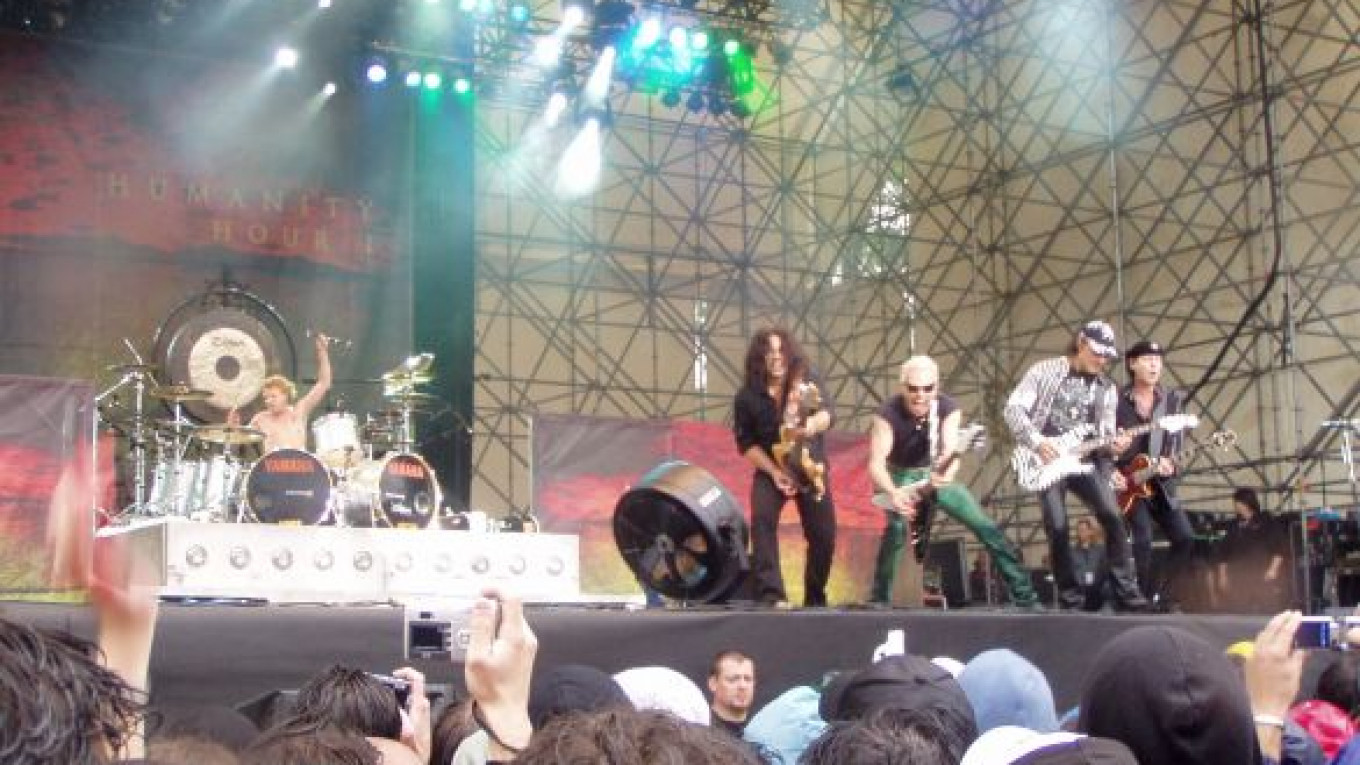Walking along the Moskva River down in Gorky Park, the crowds of nonconformist hipsters and prosperous families are probably a far cry from the scene that the German rock band Scorpions witnessed when they wrote their famous song "Wind of Change" in 1990, describing the feeling of freedom that came with perestroika. While the city landscape may have changed, Scorpions have changed very little, and have kept coming back to Russia year after year.
Now, Scorpions are back in town, giving two concerts Oct. 22 and 23 with the Sofia Symphony Orchestra, only a couple of years after what was supposed to be their retirement tour. The Moscow Times spoke with Scorpions lead singer Klaus Meine during rehearsals Monday.
"Scorpions is one of few bands who play such different formats: from a regular rock show with just the five of us, to Scorpions unplugged or crossover shows with huge symphonic orchestras," Meine said. Scorpions has played with orchestras in the past and listening to their rehearsal it was interesting to hear how the naturally symphonic sound of Scorpions was complemented by the depth provided by 50 or so backup musicians. The present show is based on arrangements played by Scorpions with the Berlin Philharmonic in 2000.
Regardless of who they play with or how they appear, Scorpions are guaranteed a warm welcome in Russia: They have been playing here for more than 20 years and have amassed a huge Russian fan base. Scorpions' complex relationship with Russia goes back all the way to 1988, when the group was one of the first Western bands to play in the Soviet Union.
Meine recalled the energy of those days, describing the crowds of exulting fans as being "like Beatlemania," particularly at the legendary Moscow Music Peace festival in 1991, now considered to have been the peak of the glam metal era.
Scorpions' hit song "Wind of Change," which was inspired by their performances in St. Petersburg and at the Moscow Music Peace Festival, speaks of a feeling of opportunity and exhorts audiences to "Let your balalaika sing / What my guitar wants to say." This song became one of the anthems of perestroika, further cementing Scorpions' popularity in Russia.
"For this rock generation, it is kind of like Woodstock, and we have kept coming back since then," Meine said of the Moscow Music Peace Festival. While Meine initially played only in Moscow and St. Petersburg, in the past decade they have expanded to cities all over Russia, playing in cities as remote as Vladivostok and Irkutsk.
"It feels like our Russian fans have a big heart for the ballads," Meine said of Russian audiences. "They really show their emotions … you can really see it, and it is really different from the rest of the world." Meine described the touching adoration that the group experienced from Russian fans, recounting how they were met at airports with flowers and often received gifts from fans at shows.
"Our parents came to Russia with tanks, and we said, 'we are coming with guitars, this is the new Germany,'" Meine said, explaining the importance of the bond with his Russian fans. "But still, you never forget what happened to our parents' generation … and we are touched when we visit Volgograd, the former Stalingrad, and go to a school and a hundred children sing ''Wind of Change.'' That is heartbreaking."
Meine said that this feeling of overcoming the past and a shared heritage in the shadow of the Berlin Wall kept the group coming back for more, adding that "it really feels like there is a bridge between us and the fans."
While some prominent Western groups have had difficulty playing in Russia or been denied visas in recent years, Meine said he had never felt uncomfortable in Russia.
"I know there are a lot of Western artists that boycott concerts here for various reasons, but this is a huge country, and it is a long way on the way to democracy, and we feel always very comfortable and connected with our fans here," Meine said. "But that does not mean that you have to agree with everything that is happening here on the political side — that is a totally different story. But we are musicians, not politicians."
Meine expressed support for all those who raised their voices in political protest, while emphasizing the immensity of Russia and the importance of recognizing the great diversity of opinions. The winds of change never cease to blow, and it seems Scorpions will keep playing as long as they do.
Scorpions will play Oct. 22 and 23 with the Sofia Symphony Orchestra at Crocus City Hall, 65-66 km MKAD, Trade and Exhibition complex bldg. 2, pavilion 3, metro Myakinino.
Contact the author at g.golubock@imedia.ru
A Message from The Moscow Times:
Dear readers,
We are facing unprecedented challenges. Russia's Prosecutor General's Office has designated The Moscow Times as an "undesirable" organization, criminalizing our work and putting our staff at risk of prosecution. This follows our earlier unjust labeling as a "foreign agent."
These actions are direct attempts to silence independent journalism in Russia. The authorities claim our work "discredits the decisions of the Russian leadership." We see things differently: we strive to provide accurate, unbiased reporting on Russia.
We, the journalists of The Moscow Times, refuse to be silenced. But to continue our work, we need your help.
Your support, no matter how small, makes a world of difference. If you can, please support us monthly starting from just $2. It's quick to set up, and every contribution makes a significant impact.
By supporting The Moscow Times, you're defending open, independent journalism in the face of repression. Thank you for standing with us.
Remind me later.






